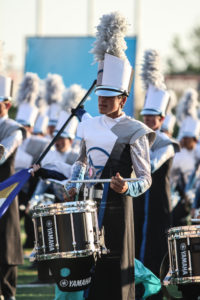The youngest participants in drum and bugle corps often make more personal tradeoffs but also potentially have the most to gain.
 Joshua Hecht began his drum corps journey at age 15. Now 17, he is competing in his second season as head drum major with the Southern Knights Drum and Bugle Corps, an Open Class ensemble from Birmingham, Alabama, that tours in the Drum Corps Associates all-age circuit, as well as in his first season as drum major with Music City Drum and Bugle Corps, a World Class corps from Nashville, Tennessee, competing in the Drum Corps International (DCI) circuit.
Joshua Hecht began his drum corps journey at age 15. Now 17, he is competing in his second season as head drum major with the Southern Knights Drum and Bugle Corps, an Open Class ensemble from Birmingham, Alabama, that tours in the Drum Corps Associates all-age circuit, as well as in his first season as drum major with Music City Drum and Bugle Corps, a World Class corps from Nashville, Tennessee, competing in the Drum Corps International (DCI) circuit.
Most high school students look forward to summer as a time to relax, spend time with friends and family, and earn some spending money. For the students who are contracted to a drum corps, summer means sacrificing those types of plans in exchange for a unique musical and travel experience.
Making Difficult Decisions
The decision to join corps as a high schooler comes fraught with difficult choices. “Last season, I had the ability to march drum corps and high school simultaneously as [Southern Knights] only met on weekends,” Hecht says. “This season wasn’t as easy. … I decided to take a step back from marching in high school due to summer scheduling.”
Most students don’t need to give up marching in high school entirely, but the choice to return to their high school programs doesn’t always mean being able to fully participate. “I am going into my senior year this fall, so I’m missing out on a lot of the last times I will get to do things with my band, like last band camp, last parent performance, last pool party, [last] senior skit, etc.,” says Maya Calnan, a first-year color guard member with Music City.
Lyllian Neuberger, another first-year Music City guard member, echoes the sentiment but also focuses on the positive side of participating in drum corps. “I’m being written out of most of the [high school] show since I’m not there to learn it,” Neuberger says. “I’ve had to give up my spot being captain, … [which was] very difficult to let go of. After being here [in drum corps], I can’t imagine doing anything else with my summer. … It’s worth every drop of sweat.”
On the other hand, some students adequately balance their high school opportunities while marching in corps. Grace Murphy will be entering her senior year and second year as a color guard section leader at her high school while being a first-year guard member for Legends Drum and Bugle Corps, a DCI Open Class group from Portage, Michigan. Though she misses some high school rehearsals during the summer, she still helps her high school while on tour. “It’s really hard with all the new girls coming in, … so I definitely do stay in touch with them and make sure all their questions get answered,” she says.
Murphy says that support from her program back home means that she’s not too worried about transitioning back to high school marching band. Her guard instructors march with other drum corps in the summer, and “they’re really proud [of me],” she says. “They’re really excited I’m here, and they’re completely understanding.”
Overcoming Schedule Snafus
 Because of the need to practice before beginning their tours, many DCI groups move in for spring training before some high schools end the academic year. “Move-ins were actually the day of my last day of school,” Murphy says. “I packed the day before, then right after school, I left.”
Because of the need to practice before beginning their tours, many DCI groups move in for spring training before some high schools end the academic year. “Move-ins were actually the day of my last day of school,” Murphy says. “I packed the day before, then right after school, I left.”
At Legends and many other corps, the administrative staff works with students to accommodate end-of-year commitments and some conflicts during the summer tour. “We want to make everybody … feel that this is an accessible environment for them to still be a high school student,” says Ibe Sodawalla, CEO and executive director with Legends Performing Arts Association. “We have a policy, for example, that we excuse them for their senior proms, and we excuse them for college orientations.”
Nick Powers, a color guard technician for Music City says the corps makes accommodations when possible. “[During] spring training, we have people come in and out as needed for graduations, etc. … as long as it’s communicated,” he says. “Same with anything scheduled way in advance. We clearly prefer if people are there all day, every day, because so much happens, … and it’s difficult to stay on top of things or catch up.”
Schedules in August can get tricky too. “I usually miss the first week of school,” says Daniel MacKenzie, who is in his second season with the Legends snare line. His high school in Indiana starts in early August.
While MacKenzie says that missing up to a week of school work can be a challenge, he isn’t worried about catching up in his high school marching band. “With the caliber of what we do [in corps], it’s easier to jump back in,” he says.
Even when Hecht only had weekend rehearsals with Southern Knights, his schedule was challenging. “I would miss parts of football games and have to endure long car rides late at night while completing school work,” he says.
However, DCA’s weekend summer schedule also has some benefits. “Marching DCA provides an incredible balance between drum corps and ‘real’ life,” Hecht says. “You are able to [march] while attending summer classes, working a job, or even just having fun with your friends!”
Transitioning to Corps Life
Every member deals with some difficulties when transitioning into life with the corps, regardless of age and when they join. “Drum corps is difficult on everyone,” says Powers, who marched drum corps before joining the staff at Music City. “It’s a culture shock for the new kids, but everyone struggles for a bit.”
Being a repeat marcher doesn’t always ensure smooth sailing. “It’s a different struggle every year,” says Jason Kehr, an 18-year-old trumpet player who has marched with Legends for three seasons.
Due to the rigor and long hours, “it’s like band camp every day,” says Legends euphonium player Lauren Schnicke. “Here, everything has a place, everything has a schedule, everybody has a place to be and a thing to do.”
However, Schnicke says that she appreciates the intensity and the logistical organization. Schnicke has had a unique experience in corps since she has joined late for two seasons in a row, filling holes for other musicians who couldn’t continue performing.
Student motivation could vary greatly between high school marching bands and drum corps. “[The dedication level] was the biggest culture shock to me,” MacKenzie says.
Because DCA corps rehearse more sporadically, adjustment is a little different. “The physical demands of DCA are not as strenuous, [but] the mental factors are increased as you need to retain information for longer periods of time,” Hecht says.
DCA is open to all ages, including people who are past the DCI ageout of 22 years old. The average age for DCA has dropped as physical demands become more intense, according to DCA President Allen Buell. “You seldom see someone in their 50s anymore because they can’t keep up,” he says.
Buell says it’s not uncommon for DCA to be a training ground for high school students who hope to eventually march in DCI. “Kids march DCA for two to three years … because they’re not ready for DCI,” he says.
As someone who did indeed start off in a DCA corps, Hecht says that “DCA is the perfect place to begin … your [drum corps] journey.”
Physical and mental stamina aren’t the only factors that affect the transition to corps life. Members must also adjust socially.
While participants range in age from 14 to 22, they tend to become fast friends. “I think with Legends especially, everyone’s such a family that you don’t really notice the age difference,” Schnicke says.
Powers mentions a similar bond among the Music City members. “It really becomes a family,” he says. “I see the older members mom the younger members naturally to make sure everyone is taking care of each other.”
Powers also notes that the individual and group responsibilities require a certain level of maturity from all members, regardless of age.
MacKenzie felt the same way his first season. “As long as [you] do [your] work, you’re accepted,” he says.
Growing Up
Students and staff agree that drum corps experiences are highly beneficial. “You have to soak it in,” MacKenzie says. “This is an experience you cannot get—you will not get—anywhere else. Just the experience of being on the road and being away from home—I think it might help me leading into college.”
Drum corps can be especially eye-opening for high schoolers. “Most people who come to us when they’re in high school may not have too many experiences outside of their home environments or communities,” Sodawalla says. “They’re pushed in ways that expand their experiences and horizons.”
Powers points out that students who start marching in high school gain a few extra years of eligibility to perform with DCI corps. “I think the kids who begin in high school can get into the groove a bit quicker,” he says. “They will have more time to be able to understand their responsibilities. But the burnout rate for people that start super early is higher than people that only have one to two years to march.”
Drum corps members also become role models for younger audience members as they travel. Murphy remembers looking up to members of drum corps color guards in the past. “I’m excited to be someone that younger guard girls can look up to,” she says. “Skill-wise, I’ve gained so much new information. … I’ve learned how to push myself more … now that I know I can.”
Neuberger says she has grown as well. “I’ve learned you can always push farther,” she says. “Marching with Music City has allowed me to see my true potential. … Because I’m here, I’ll be able to jump in quickly [back home].”
Calnan looks forward to taking skills home as well. “I’ve gained leadership skills and technical skills beyond what my [high school] program offers,” she says.
Calnan says that these new skills will make her last year with her high school band even better.
All of these students agree that what they’ve gained is worth the sacrifices, and they encourage others to consider marching. “As long as you understand what you’re getting into, go for it,” Schnicke says. “I wouldn’t trade it for the world. It’s incredible, but it’s a lot.”
At the very least, they say to try the audition camp. “It really gives you a taste of what the summer’s going to be like,” Murphy says.
For young students, trying this new activity can lead to greater self-awareness and possibly a lifelong passion. “Do it, do it, do it, do it, do it,” Kehr says. “There’s nothing better than just trying. Even if you don’t like it, you have a new understanding of yourself and what you enjoy, and it can be something that can truly change your life forever.”


